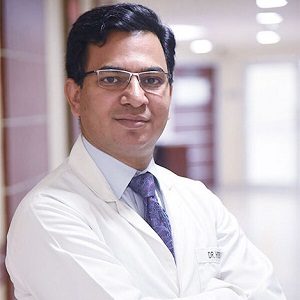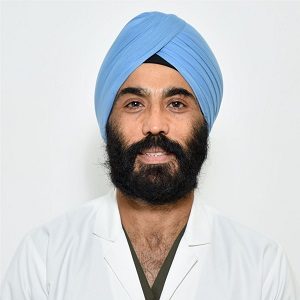Best Doctors in India for Alcoholic Hepatitis Treatment
- Obstetrician & Gynaecologist, Gurugram, India
- Over 15 years’ experience
Profile Highlights:
- Priyanka Mishra is a renowned doctor for Obstetric & Gynecological issues in Delhi/ NCR.
- She has completed MBA in Hospital and Healthcare management from NIBM.
- Priyanka Mishra has used her extensive experience to provide consultation for women’s problems and treatment.
- Orthopedic Surgeon, Gurugram, India
- Over 18 years’ experience
Profile Highlights:
- Sandeep Chauhan is one of the best orthopedic surgeons and an expert in managing complex fractures, even in children, soft tissue injuries, septic arthritis, and osteomyelitis.
- He performs fracture reconstructions; and arthroplasty procedures like surface replacements, cemented and un-cemented THR, Total Knee Replacement, musculoskeletal infections, UKA knee, hip, shoulder, & elbow replacements.
- Obstetrician & Gynaecologist, Gurugram, India
- Over 20 years’ experience
Profile Highlights:
- Dr. Smita Vats is a dedicated gynecologist & obstetrician in Delhi/ NCR. She received extensive training in advanced gynecological endoscopy, laparoscopy, and hysteroscopy from renowned surgeons in India and abroad.
- Dr.Smita Vats is especially interested in infertility treatments, gynecologic endoscopic surgeries, high-risk pregnancy management, and adolescent and menopausal issues.
- Orthopedic Surgeon and Spine Surgeon, Gurugram, India
- Over 15 years’ experience
Profile Highlights:
- Dr. Hitesh Garg is one of the best spine surgeons in Gurugram.
- Dr. Hitesh Garg has undertaken over 5000 spine surgical operations, including 2500+ spinal fusions (TLIF, ACDF, and others); 1000 malformation revision operations (Scoliosis and kyphosis), 300 lumbar and cervical artificial disc replacements, 500 fracture treatments, and 500 other intricate procedures such as a spinal tumor, congenital defects, and spinopelvic fixations.
- Orthopedic Surgeon, Gurugram, India
- Over 25 years’ experience
Profile Highlights:
- Dr. I.P.S. Oberoi is the leading Orthopedic and Joint Replacement Surgeon in India with over 25 years of experience.
- He has a 97% success rate in performing more than 7000 joint replacements.
- He was the first and one of the only a few surgeons to do Key Hole Surgery (Arthroscopy) for Shoulder, Knee, Elbow, Hip, and Ankle Injuries.
- GI Surgeon and Liver Transplant Surgeon, Gurugram, India
- Over 20 years’ experience
Profile Highlights:
- Dr. Amit Nath Rastogi is a pioneer in the field of liver transplant surgery. He completed his fellowship in liver transplant surgery at Sir Gangaram hospital while being a part of the largest liver transplant program in the country.
- Furthermore, he received his training in robotic liver surgery from IRCAD -Strasbourg, France, and advanced robotic HPB training from Grosseto.
- Hematologist, Gurugram, India
- Over 10 years’ experience
Profile Highlights:
- After years of practice, Dr. Neha Rastogi has unmatched expertise in diagnosing and treating different kinds of disorders such as anemia, thalassemia, hemophilia, solid tumors, and blood cancers.
- Besides all this, she has the ability to diagnose and treat various primary immunodeficiency disorders as well.
- Being interested in cellular and immunotherapy, Dr. Neha Rastogi works with the agenda of transforming the face of cancer disorders and transplantation.
- Liver Transplant Surgeon, Gurugram, India
- Over 10 years’ experience
Profile Highlights:
- Dr. Prashant Vilas Bhangui is one of the highly trained liver transplant specialists who received his training in Surgical Gastroenterology and Liver Transplantation.
- He also holds a European Inter-University Diploma in Hepato-Biliary-Pancreatic Cancers.
- Dr. Prashant is further interested to work in certain fields which include hepatocellular carcinoma, colorectal liver metastases, and living donor liver transplantation. Besides this, he has also published several journals on these subjects.
- Ophthalmologist, Gurugram, India
- Over 13 years’ experience
Profile Highlights:
- Dr. Svati Bansal is an esteemed consultant and practitioner of ophthalmology in Gurugram.
- Her specialty lies in orbit and oculoplasty, ocular oncology, ocular trauma, and neuro-ophthalmology.
- She has fellowships in neuro-ophthalmology and ocular motility, oculoplasty, and facial aesthetics, and ocular oculoplastic and ocular oncology.
- Obstetrician & Gynaecologist, Gurugram, India
- Over 18 years’ experience
Profile Highlights:
- Dr. Asha Sharma is one of the best Gynecologists & Obstetricians in Delhi/ NCR. She practices Laparoscopic Surgery (Obs & Gyn) to assist patients with their Gynaec problems.
- The doctor provides consultations and checkups for maternal care, PCOS/PCOD, egg donation, diseases in pregnancy, irregular or excessive bleeding, and other menstrual disorders in adolescent girls, etc.
Best Hospitals in India for Alcoholic Hepatitis Treatment
ALCOHOLIC HEPATITIS
Alcoholic hepatitis is a liver infection, which is mainly caused by frequent, heavy use of alcohol. Fat can build up in the liver cells, which might lead to inflammation as well as scarring of the liver.
Alcoholic hepatitis might be mild or severe. A patient might even need a liver transplant if proper treatment is not provided, or if they don’t stop consumption of alcohol.
It is also notable that all heavy drinkers don’t develop this condition, and sometimes this condition even develops in people who drink moderately. However, if you are diagnosed with this condition, it is important for you to quit drinking alcohol. People who continue drinking alcohol might face a huge risk of serious liver damage as well as death.
Symptoms
Depending on the amount of damage to the liver, the symptoms can vary. If you are having a mild form of the disease, you might not even experience any symptoms at all. However, as the damage continues to grow, you might experience the following:
- Changes in appetite
- Dry mouth
- Weight loss
- Pain or swelling in the abdomen
- Jaundice, or yellowing of the skin or eyes
- Fever
- Nausea and vomiting
- Easy bleeding or bruising
- Changes in your mental state, including confusion
- Fatigue
The symptoms of this condition are similar to those caused by a few other health conditions. Therefore, if you develop any of these symptoms, it is best to get a proper diagnosis as well as begin treatment.
Causes & risk factors
Alcoholic hepatitis generally develops when the alcohol you drink causes damage to your liver. However, it is not clear why alcohol does this damages only to some heavy drinkers.
Few factors that are known to play a role in this condition include:
- The body’s process that breaks down alcohol produces some toxic chemicals
- These chemicals can trigger inflammation that can destroy the liver cells
- Thus, over time, scars replace healthy liver tissue, thus interfering with the function of the liver
- This irreversible scarring, which is also termed cirrhosis, is the final stage of alcoholic liver disease
If you have hepatitis C and continue to drink, even moderately, you are more likely to develop cirrhosis.
Some heavy drinkers are also malnourished because they don’t eat a proper balanced diet. Alcohol and its byproducts also prevent the body from absorbing nutrition properly. Lack of nutrition can contribute to liver cell damage.
Some other risk factors that can lead to this condition include:
- Your sex- Women are usually at a higher risk of developing alcoholic hepatitis since the way alcohol is processed in women is different.
- Binge drinking- Having over five drinks within two hours for men and four or more for women can increase the risk of alcoholic hepatitis.
- Obesity- Heavy drinkers who are overweight are also more likely to develop alcoholic hepatitis and to progress from that condition to cirrhosis.
- Race and ethnicity- Hispanic and Negroid people might be at higher risk of alcoholic hepatitis.
- Genetic factors- According to studies, there may be a genetic component in alcohol-induced liver disease. However, it is difficult to separate genetic and environmental factors.
Diagnosis
If you are showing symptoms of alcoholic hepatitis, your doctor will first inquire about your medical history and alcohol consumption. Next, he/she will perform a physical exam to see if you have an enlarged liver or spleen. They might also need a few more tests to confirm your diagnosis, such as:
- Complete blood count (CBC)
- Liver function test
- Ultrasound of the liver
- Abdominal CT scan
- Blood clotting tests
In some cases, a liver biopsy might also be needed to confirm the diagnosis of alcoholic hepatitis. A liver biopsy requires your doctor to remove a tissue sample from your liver, which is then tested in the lab. This method helps to show the severity and type of liver disease.
Treatment
Stopping alcohol consumption is the most important treatment for alcoholic hepatitis. There is no cure for this condition, but treatment can help in reducing or eliminating symptoms, or stopping its progression.
It is also important to note that scarring of the liver is permanent, but treatment can aim to restore as much function as possible.
Dietary changes
Medication
Liver transplant
The best hope of recovery is to be aware of the signs and symptoms as well as to reduce, manage, or if possible, completely stop consumption of alcohol.
Complications
Alcoholic hepatitis might lead to severe other complications such as:
- Enlarged veins (varices)- In this condition, blood that is unable to flow freely through the portal vein, can back up into other blood vessels in your esophagus or stomach.
- Hepatic encephalopathy- This condition can be caused by the buildup of toxins if your damaged liver is unable to remove all the toxins from your body. It involves confusion, drowsiness, and slurred speech.
- Ascites- Ascites is a condition in which the fluid that accumulates in the abdomen may get infected and thus, require treatment with antibiotics. Although this condition is not life-threatening, it can be a sign of advanced alcoholic hepatitis, or cirrhosis.
- Kidney failure- A damaged liver affects blood flow to the kidneys, thus resulting in kidney failure.
- Cirrhosis- The scarring of the liver might lead to liver failure.
Prevention
Alcoholic hepatitis might be prevented if you take the following steps:
- Drink alcohol in moderation, if at all- For healthy adults, moderate drinking means no more than one drink a day for women of all ages and men older than 65, and not over two drinks a day for men aged 65 and younger. However, if you prevent all alcohol, it is a certain way to prevent this condition.
- Check before mixing medications and alcohol- Ask your doctor if it’s safe to drink alcohol while you are taking medications. Consider reading the warning labels on over-the-counter medications as well. Don’t drink alcohol when you are taking medications that warn of complications when combined with alcohol.
- Protect yourself from hepatitis C- Hepatitis C is an infectious liver disease that is caused by a virus. If it is left untreated, it may lead to cirrhosis. If you are having hepatitis C and you consume alcohol, you’re generally more likely to develop cirrhosis than if you don’t drink.















